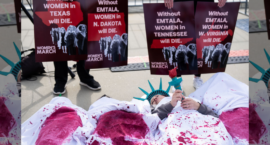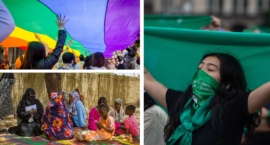The 16th annual Global Women’s Rights Awards, hosted by the Feminist Majority Foundation (publisher of Ms.), convened Tuesday evening in Los Angeles. This year’s awards celebrated the activism to secure final ratification of the Equal Rights Amendment and the bravery of both U.S. and Afghan women in the face of misogynistic laws and leadership.
The evening recognized three honorees in particular who have contributed greatly to advancing the rights of women and girls: Former U.S. Rep. Carolyn Maloney, Dr. Austin Dennard, and the Bread and Roses documentary team, including director Sahra Mani.












